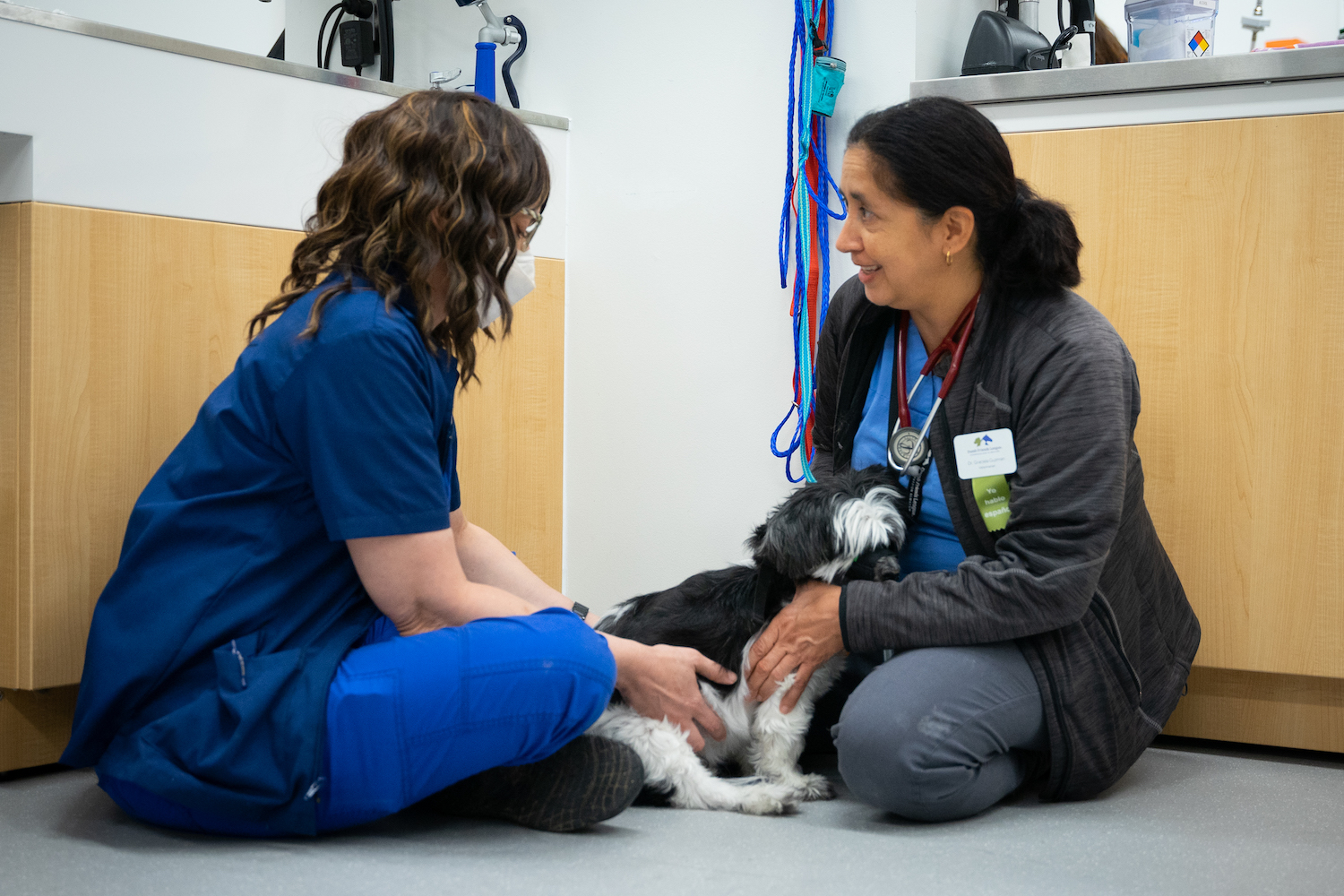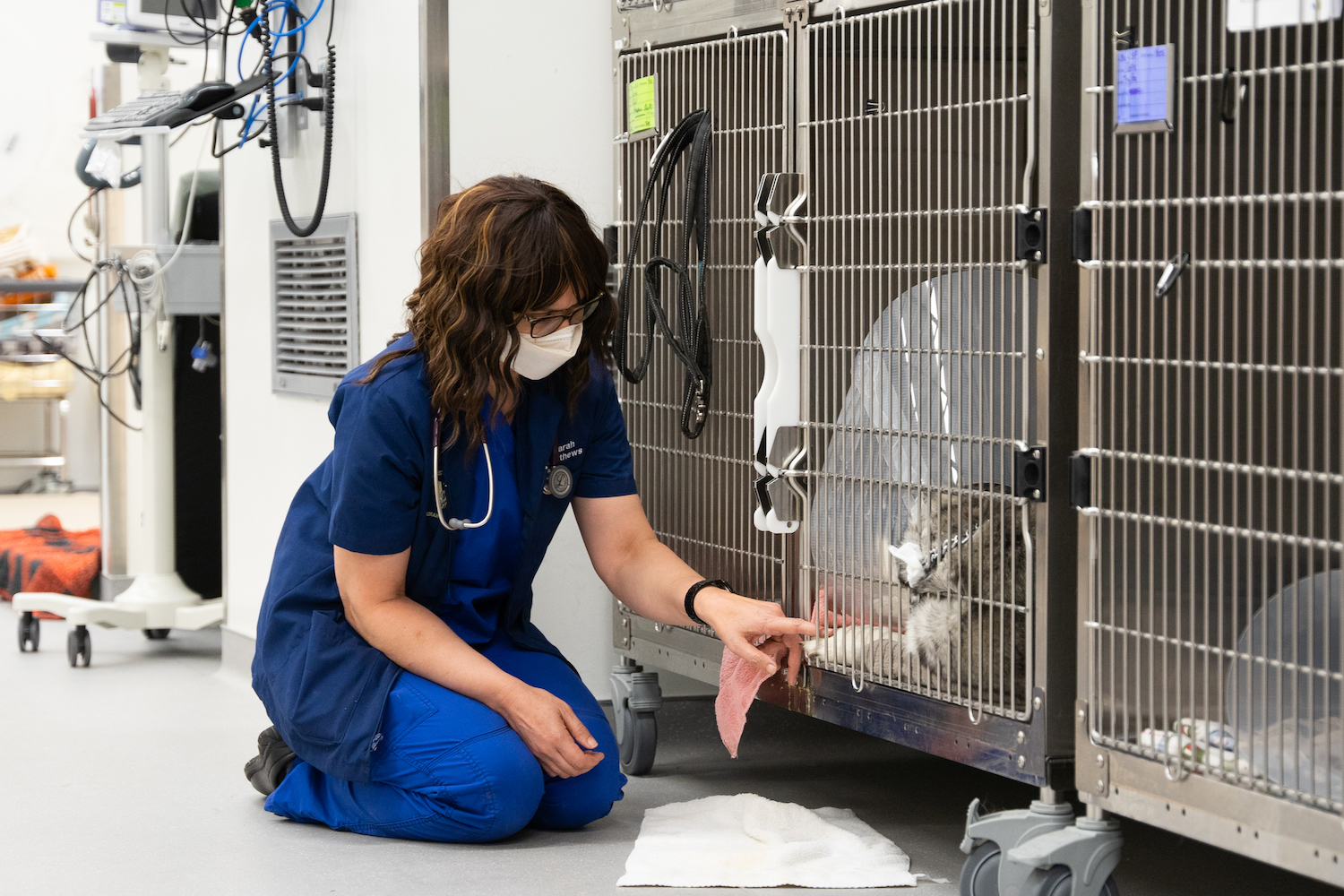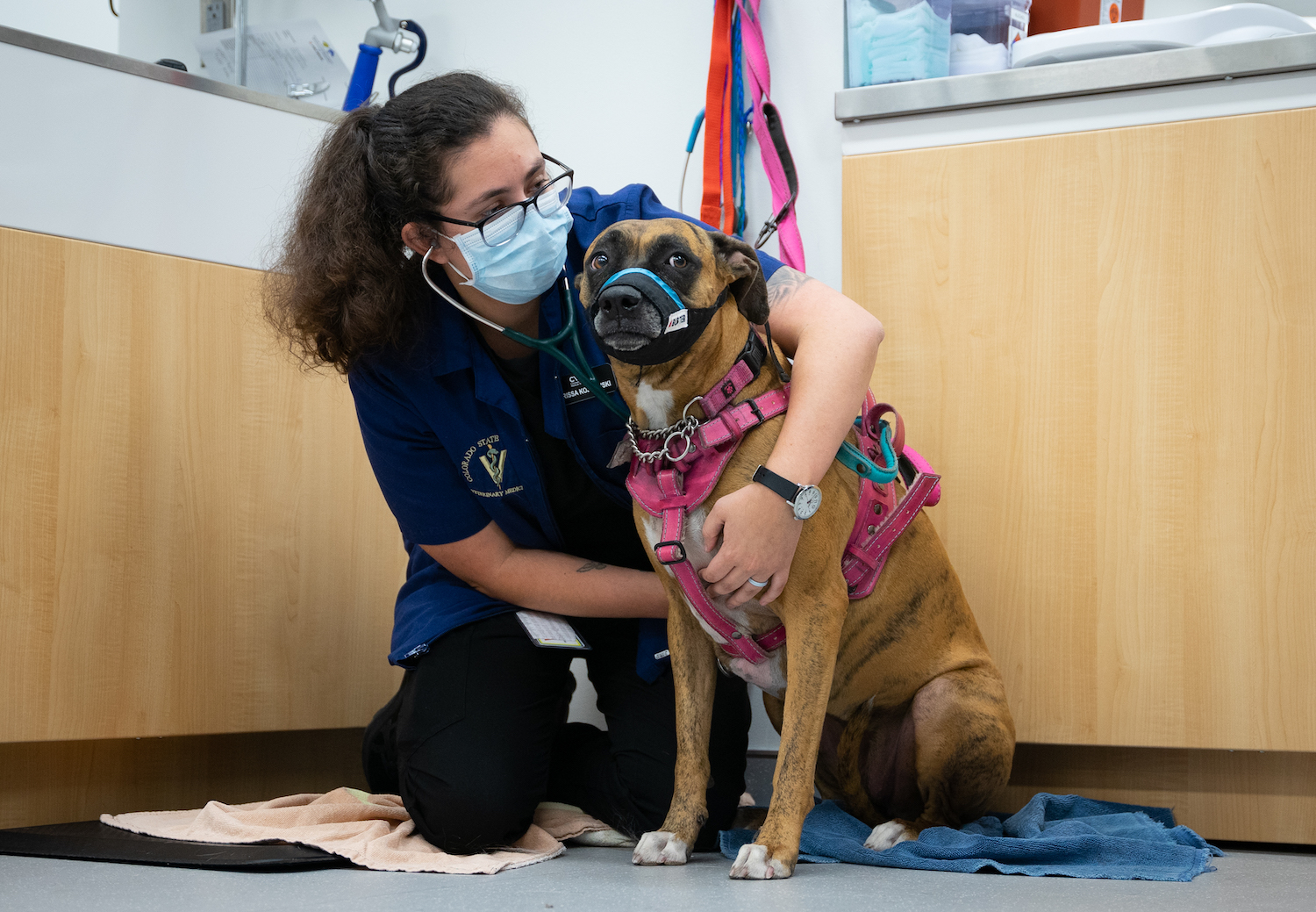
Sarah Matthews, a CSU veterinary student (left), sits with Dr. Graciela Guzman, a veterinarian and clinical instructor at the Denver Dumb Friends League’s Veterinary Hospital at CSU Spur.
Resting in a corner beside an exam table, taking shallow breaths, Coqueta conveyed resignation and a sort of gentle tranquility. Her eyes, nearly hidden under tufts of white fur, brightened slightly when Sarah Matthews, a fourth-year veterinary student at Colorado State University, greeted her. Then the 6-year-old Shih Tzu slumped against a staff member as Matthews conducted a physical exam and lingered over the animal’s abdomen.
Moments later, Matthews conferred with Dr. Graciela Guzman, a veterinarian and clinical instructor at the Denver Dumb Friends League’s Veterinary Hospital at CSU Spur, about her impressions and what they might mean. Coqueta was barely eating, according to her owner, and yet her belly was swollen and taut like a balloon.
Both were concerned.
Guzman outlined possible trajectories for the day, and where they all might lead based on Coqueta’s symptoms and the swelling on her stomach. “If it is a mass,” Guzman said, “we can talk about when we start having the conversation about quality of life.”
Protecting and supporting “quality of life”—for animals, as well as pet owners and care providers—is an overarching and oft-stated goal for the Dumb Friends League and at the organization’s new Veterinary Hospital at CSU Spur. The hospital, which opened in January and occupies a prominent location on the first and second floors of the campus’s Vida building, provides donor-subsidized care for hundreds of companion animals each week.
It’s also an educational hub for students from CSU’s College of Veterinary Medicine and Biomedical Sciences to complete an externship in community veterinary services as part of the year-long series of clinical experiences that concludes the Doctor of Veterinary Medicine (DVM) program.
While other rotations emphasize cardiology, anesthesia, and other specific aspects of veterinary care, often exploring the limits of possible treatment, a two-week experience with Dumb Friends League, taken this year by 60 students in a class of 150, focuses on providing care when client resources are limited.
Externs spend one week at the League’s Leslie A. Malone Center shelter, where the focus is on learning spay/neuter techniques, dentistry, and other practices used in caring for unowned animals. At CSU Spur, externs spend a week overseeing receiving supervised guidance while participating in every aspect of care for animals brought to the facility. “For many, this is their first taste of being a real vet,” said Daria McKay, the League’s director of community veterinary services.
Guzman (BS, ’98; DVM., ’03), who has been a veterinarian with the Dumb Friends League in different capacities since 2010, started as the organization’s clinical instructor in August. Typically, she oversees three or four externs spending the week at the hospital, alternately serving as teacher, mentor, and problem solver. While the DVM curriculum necessarily introduces students to the “gold standard” of veterinary medicine, she coaches them in offering “incremental care,” a tiered approach to diagnostics and treatments when financial resources are limited. She helps externs guide owners in selecting from a variety of subsidized care options while recognizing trade-offs and confronting, at times, the need to make difficult care decisions.
The reality and necessity of confronting such trade-offs, Guzman said, and of not always being able to offer “perfect” or attainable solutions, can be draining. She models for the externs an approach centered on wide-ranging compassion.
“I want them to see how to enjoy being a veterinarian through all the challenges we face,” Guzman said.
The challenges confronted on a Tuesday morning in September were varied. As Coqueta awaited a decision about next steps, a husky rested gingerly in a kennel, his snout pierced by dozens of porcupine quills. Kimber, a boxer thought to be 4 years old, had irritated paws and was showing troubling signs of hip dysplasia.
After examining Kimber, Larissa Kozlowski, a fourth-year student from New Mexico interested in pursuing small animal general practice upon graduation, reflected on the externship experience at CSU Spur.

Matthews attends to a husky who was brought into the hospital after an altercation with a porcupine.

Larissa Kozlowski, a fourth-year student from New Mexico, with Kimber.
“They let you figure out how to be a doctor,” she said. And part of that, she continued, involves “understanding what an animal means to each person.”
Guzman and Matthews talked about how to discuss prognosis and options with Coqueta’s owner. They suspected the dog had cancer and that her current discomfort would quickly lead to debilitation as the disease progressed. Diagnostic tests of escalating expense could support or confirm that suspicion, and yet it was unlikely they would find feasible treatment options that would do much beyond extending her suffering.
In a small exam room, with Guzman nearby, Matthews talked to Carlos Varela about options given Coqueta’s worsening condition. He could wait and try to keep her comfortable, seek more information through an ultrasound, or try to obtain a definitive diagnosis with a biopsy. And he could consider euthanasia, now or in the coming days. Varela, frowning, demurred, explaining his wife wasn’t with him. He asked to have an ultrasound performed.
The test pointed in the least promising direction. A large mass was filling much of Coqueta’s abdomen, pushing against organs, and making it difficult for the small dog to fill her lungs with air. It was almost certainly cancer, and Matthews would convey the news to Varela.
“This is a tough conversation,” Guzman said. “They all hear ‘cancer’ or ‘tumor,’ and sometimes they shut down.”
Varela did not shut down when Matthews explained the test results and talked about options, including euthanasia. Often, she explained, people find it comforting to be with their animals at the end, when the suffering stops.
Varela, though saddened, agreed. He’d take Coqueta home for goodbyes, and then return.
Weeks later, Matthews and Kozlowski reflected on their experiences during the externship. For Kozlowski, one highlight was treating a pit bull that was brought to the hospital. The dog was “pretty sick,” and she determined the cause was pyometra, an infection of the reproductive system that can be fatal if allowed to progress. Treatment involved spaying the dog, and “she did really well after that,” Kozlowski said.
For Matthews, the experience was rewarding and, at times, emotional. At one point, an owner, faced with the suffering of his dog, started crying, and she did as well. “I think that’s okay,” she said. “Veterinarians are not robots. Most of us go into the profession because we love animals and cherish the human-animal bond.”
About CSU Spur
CSU Spur is a new, free educational year-round public life-long learning destination in Denver focused on engaging PreK-12 students, families, and visitors around food, water, and health. CSU Spur showcases the work of the CSU System campuses: CSU, CSU Pueblo, and CSU Global, and offers degree programs that originate from the campus offerings. Spur is built upon the land-grant mission of access to education and the belief that students can be anything they want to be. To inspire learners of all ages to engage in important world issues, CSU Spur brings together scientists to collaborate, puts science on-display, and showcases career paths. The CSU Spur campus provides immersive learning experiences and cutting-edge research across three buildings: Vida, Terra, and Hydro. Learn more at CSUSpur.org.
About the Dumb Friends League Veterinary Hospital at CSU Spur
The Dumb Friends League Veterinary Hospital at CSU Spur is a full-service, donor-subsidized animal hospital dedicated to preventing and alleviating suffering in pets whose owners are otherwise unable to access care. The League’s Community Veterinary Services team provides families in need with urgent, incremental care; definitive treatment options; and supportive resources to help keep their companion animals healthy and by their side for many years to come. This location houses a Feline Spay/Neuter Clinic for owned and community cats; Trap-Neuter-Return (TNR) services managed by the League’s Metro Cat Street Team; field education and experience for veterinary students and new graduates; and unique learning opportunities for diverse, underserved communities interested in veterinary medicine and animal welfare. Learn more at ddfl.org.